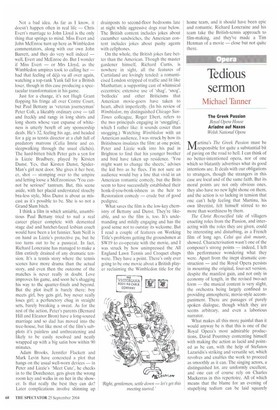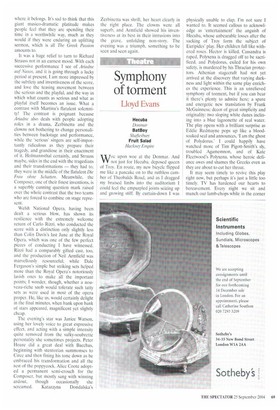Tedious sermon
Michael Tanner
The Greek Passion Royal Opera House Ariadne auf Naxos Welsh National Opera
Martinu's The Greek Passion must be responsible for quite a substantial bit of paving on the road to hell. I can think of no better-intentioned opera, nor of one which so blatantly advertises what its good intentions are. It deals with our obligations to strangers, though the strangers in this case are local and of the same faith. But its moral points are not only obvious ones, they also have no new light shone on them, and the action is so lacking in tension that one can't help feeling that Martinu, his own librettist, felt himself stirred to no more than worthiness by them.
The Christ Recrucifled tale of villagers enacting roles from the Passion, and interacting with the roles they are given, could be interesting and disturbing, as a French film of long ago, Celui qui doit mourir, showed. Characterisation wasn't one of the composer's strong points — indeed, I left this performance wondering what they were. Apart from the inept dramatic construction — and the Royal Opera persists in mounting the original, four-act version, despite the manifest gain, and not only in economy of length, in the revised two-act form — the musical content is very slight, the orchestra being largely confined to providing atmospheric, movie-style accompaniment. There are passages of purely spoken dialogue, though which they are seems arbitrary, and even a laborious narrator.
What makes all this more painful than it would anyway be is that this is one of the Royal Opera's most admirable productions, David Pountney contenting himself with making the action as lucid and pointed as he can, with the help of Stefanos Lazaridis's striking and versatile set, which revolves and enables the work to proceed as smoothly as it can. The singing actors, a distinguished lot, are uniformly excellent, and one can of course rely on Charles Mackerras in this repertoire. All of which means that the blame for an evening of stupefying tedium can be laid squarely where it belongs. It's sad to think that this giant musico-dramatic platitude makes people feel that they are spending their time in a worthwhile way, much as they would if they were enduring an uplifting sermon, which is all The Greek Passion amounts to.
It was a huge relief to turn to Richard Strauss not in an earnest mood. With each successive performance I see of Ariadne auf Naxos, and it is going through a lucky period at present, I am more impressed by the subtlety and inventiveness of the score, and love the teasing movement between the serious and the playful, and the way in which what counts as serious and what as playful itself becomes an issue. What a contrast with Martinu's flatulent solemnity! The contrast is poignant because Ariadne also deals with people adopting roles in a drama, Zerbinctta and the clowns not bothering to change personalities between backstage and performance, while the 'serious' singers are self-importantly ridiculous as they prepare their tragedy, and grandiose in their enactment of it. Hofmannsthal certainly, and Strauss maybe, sides in the end with the tragedians and their transformations — they had to, they were in the middle of the flatulent Die Frau ohne Schatten. Meanwhile. the Composer, one of their finest inventions, is a superbly cunning question mark raised over the whole contrast that the two teams who are forced to combine on stage represent.
Welsh National Opera, having been dealt a serious blow, has shown its resilience with the extremely welcome return of Carlo Rizzi, who conducted the score with a distinction only slightly less than Colin Davis's last June at the Royal Opera, which was one of the few perfect pieces of conducting I have witnessed. Rizzi had a comparably gifted cast, too, and the production of Neil Armfield was marvellously resourceful, while Dale Ferguson's simple but striking sets helped more than the Royal Opera's notoriously lavish ones to make all the important points; I wonder, though, whether a nouveau-riche snob would tolerate such tatty sets as were used in most of the opera proper. He, like us, would certainly delight in the final minutes, when bank upon bank of stars appeared, magnificent yet slightly cheap.
The evening's star was Janice Watson, using her lovely voice to great expressive effect, and acting with a simple intensity quite removed from the sulky-soubrette personality she sometimes projects. Peter Hoare did a great deal with Bacchus, beginning with stentorian summonses to Circe and then fining his tone down as he embraced his transformation and all the rest of the poppycock. Alice Coote adopted a permanent semi-crouch for the Composer, but mostly sang with winning ardour, though occasionally she screamed. Katarzyna Dondalska's Zerbinetta was shrill, her heart clearly in the right place. The clowns were all superb, and Armfield showed his inventiveness at its best in their intrusions into the grave, unfolding non-story. The evening was a triumph, something to be seen and seen again.



























































































 Previous page
Previous page